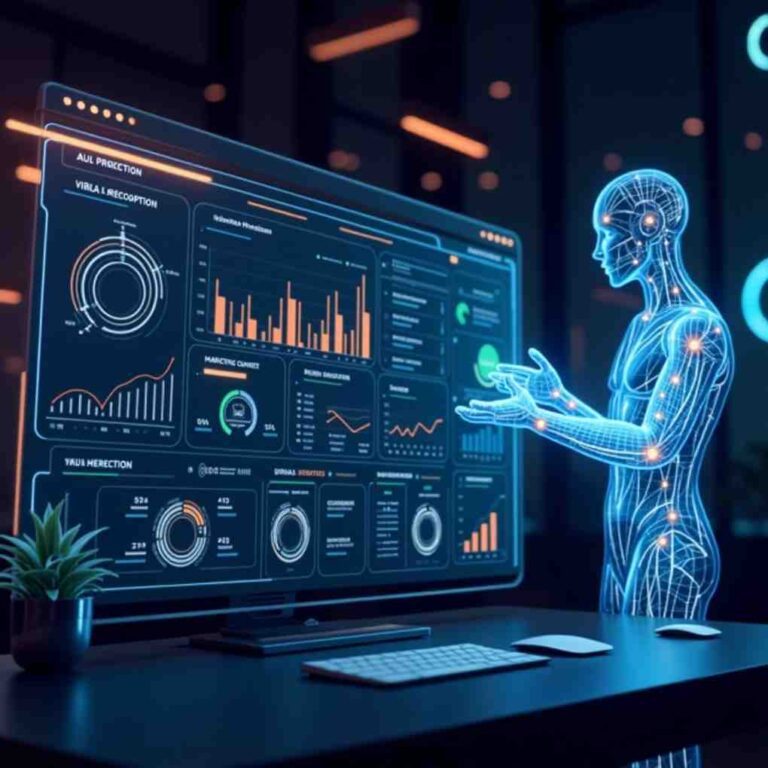Table of Contents
Introduction
AI in healthcare is revolutionizing early disease detection. With advanced machine learning algorithms, AI can analyze medical data faster and more accurately than traditional methods. This article explores how AI is improving early diagnosis, reducing misdiagnoses, and saving lives.
How AI Detects Diseases Early
1. AI-Powered Medical Imaging
AI-driven imaging tools enhance the accuracy of X-rays, MRIs, and CT scans, identifying abnormalities that may be missed by human radiologists.
- Example: Google’s DeepMind AI detects eye diseases with 94% accuracy.
- Pro Tip: AI can differentiate between cancerous and benign tumors, reducing unnecessary biopsies.
- Impact: Faster, more reliable diagnoses improve patient outcomes.
2. Predictive Analytics for Risk Assessment
AI analyzes patient history, genetics, and lifestyle factors to predict disease risk.
- Example: IBM Watson identifies early-stage lung cancer with 96% accuracy.
- Impact: Helps doctors recommend personalized preventive care, reducing long-term healthcare costs.
3. AI in Pathology
AI-powered pathology tools analyze tissue samples faster and more accurately than traditional methods.
- Example: AI detects breast cancer cells with 99% accuracy.
- Benefit: Faster diagnosis leads to early treatment and higher survival rates.
- Advantage: Reduces human error and speeds up lab processing times.
4. Wearable AI Health Monitors
AI-powered wearables track vital signs and detect irregularities in real-time.
- Example: Apple Watch detects atrial fibrillation, preventing strokes.
- Usage: Continuous monitoring alerts users to potential health issues before symptoms arise.
- Impact: Improves patient awareness and encourages proactive healthcare.
5. AI for Neurological Disease Detection
AI algorithms identify early signs of diseases like Alzheimer’s and Parkinson’s by analyzing speech patterns and cognitive responses.
- Example: AI detects Alzheimer’s 5 years before symptoms appear.
- Outcome: Early intervention slows disease progression and improves quality of life.
- Advantage: Provides non-invasive and cost-effective early screening.
6. AI in Blood Test Analysis
AI enhances traditional blood test diagnostics by identifying patterns linked to diseases.
- Example: AI detects sepsis 24 hours earlier than doctors.
- Advantage: Early detection improves treatment outcomes and saves lives.
- Impact: Reduces hospital stays and lowers healthcare expenses.
7. AI in Cancer Detection
AI-powered tools identify cancerous cells in mammograms, Pap smears, and biopsy reports.
- Example: Google’s AI detects breast cancer with 99% accuracy.
- Impact: Reduces false positives and unnecessary treatments.
- Pro Tip: AI can flag high-risk cases for immediate follow-up, improving survival rates.
8. AI and Genetic Analysis
AI identifies genetic mutations linked to hereditary diseases.
- Example: AI predicts the likelihood of developing conditions like diabetes or heart disease.
- Usage: Helps doctors develop personalized treatment plans.
- Advantage: Enables early lifestyle changes to prevent disease onset.
9. AI Chatbots for Symptom Analysis
AI chatbots assess symptoms and guide users to appropriate medical care.
- Example: Babylon Health’s AI chatbot provides medical advice with 90% accuracy.
- Benefit: Reduces unnecessary doctor visits while ensuring urgent cases get immediate attention.
- Impact: Improves accessibility to healthcare for remote and underserved populations.
10. AI in Drug Discovery for Early Treatment
AI accelerates drug discovery, ensuring quicker treatment options for emerging diseases.
- Example: AI identified potential COVID-19 treatments within days.
- Impact: Faster treatment development leads to better patient outcomes.
- Pro Tip: AI reduces research costs and expedites the clinical trial process.
Pros and Cons of AI in Healthcare
Pros:
- Faster Diagnoses – AI reduces the time needed for disease detection.
- Higher Accuracy – Minimizes human errors and enhances diagnostic precision.
- Cost Savings – Early detection lowers long-term healthcare costs.
- Continuous Monitoring – AI wearables provide real-time health tracking.
- Personalized Medicine – AI tailors treatments based on patient data.
- Better Access – AI chatbots provide medical advice 24/7.
Cons:
- High Initial Costs – AI implementation requires significant investment.
- Data Privacy Risks – AI relies on sensitive patient data, raising security concerns.
- Limited Human Interaction – Patients may prefer direct communication with doctors.
- Reliability Issues – AI decisions depend on the quality of input data.
- Ethical Concerns – AI’s role in medical decision-making raises ethical questions.
Conclusion
AI is transforming the healthcare industry by enabling early disease detection, improving diagnostic accuracy, and personalizing treatment plans. With its ability to analyze massive amounts of medical data in seconds, AI significantly enhances efficiency, reduces costs, and improves patient outcomes. However, it is essential to balance AI implementation with ethical considerations, data privacy protection, and human expertise.
The future of AI in healthcare is promising, with continuous advancements leading to even more accurate and faster disease detection methods. As AI technology evolves, it will further bridge the gap between early diagnosis and effective treatment, ultimately saving countless lives.
AI is revolutionizing healthcare! Stay updated with the latest AI advancements by subscribing to our newsletter. If you’re interested in exploring AI-powered healthcare solutions, check out our expert resources today!
Disclaimer
This article is for informational purposes only. Consult a healthcare professional for medical advice. AI tools should be used as an aid, not a replacement for expert medical consultation.








